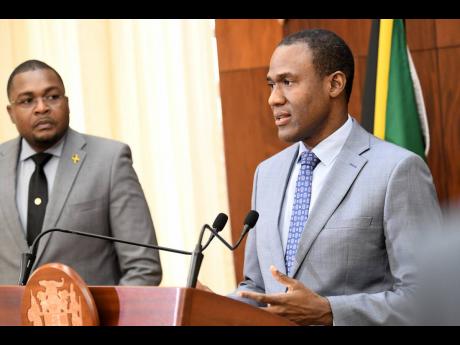‘Agonising’ decision
Gov’t explored several options to calm public uproar over politicians’ salary hike
THE GOVERNMENT reportedly considered “several options” in its own salary review, including pegging ministers’ salaries to the midpoint of the scale for permanent secretaries and not the highest amount which was ultimately used, multiple Holness...
THE GOVERNMENT reportedly considered “several options” in its own salary review, including pegging ministers’ salaries to the midpoint of the scale for permanent secretaries and not the highest amount which was ultimately used, multiple Holness administration sources have confirmed.
The choices were among Monday’s Cabinet discussions over what could be done to sooth public disquiet and growing calls for a rollback of the massive increases, many over 200 per cent, approved for politicians, said one official who will not be named, as the individual was not authorised to speak on the matter.
Ultimately, when Prime Minister Andrew Holness faced Jamaicans in a press briefing later that evening, he was alone in announcing that he was declining his 214 -per -cent increase to show that he “symbolically and truthfully” understands the public backlash over the massive increase announced a week ago.
“This government takes the time to properly analyse, deliberate, and yes, agonise over making these decisions. We don’t make them lightly. We don’t make them trying to ignore how you feel about your politicians,” said Holness, as he encouraged ministers, members of parliament and councillors to accept their increases.
Yesterday, Information Minister Robert Morgan would not be drawn on what may have been deliberated, he saying, “I cannot discuss anything that happens at Cabinet unless it’s in the minutes. So, discussions at Cabinet are privileged.”
For decades, ministers’ salaries have been tied to permanent secretaries (PS), the chief administrators of ministries.
“Ministers do not move,” Morgan said, referring to salary scales. “We do not get increments; we do not get adjustments in our salaries based on what permanent secretaries would get. If you are saying that a permanent secretary can move on the scale and a minister cannot move then obviously you’d have to put a minister at a point where no matter how much the permanent secretary moves within a period, they would not be able to overtake.”
He added: “We’re one of the few public sector workers who, once our salary is set, it is set. The last time it was 15 years. And I don’t suspect it will be moving anytime soon, probably for the next 30 years based on everything that we’re hearing. We did not get an opportunity to discuss our salaries. There was no negotiation.”
On whether his ministry had proposed options to Cabinet, Finance Minister Dr Nigel Clarke, who was also at the briefing, said: “The ministry would have brought or, as I said, the framework for compensation has not changed.”
He explained: “The ministry would not on its own suggest a different framework. If there were to be a different framework, it would have to come from an independent source. All the ministry did was to apply an existing framework to a new compensation spine.”
Almost 40 years ago, a parliamentary committee approved ministers’ salaries at $1 per week ($52 per annum) above the maximum permanent secretary scale.
The prime minister’s salary is calculated at 25 per cent above the Cabinet Minister; the deputy prime minister and leader of the opposition at 12.5 per cent, and the finance minister’s at 7.5 per cent above the Cabinet Minister, rates that the government revised slightly downwards over those in place for the last 30 years.
Under the new compensation system for government workers, permanent secretaries have been placed at band 15 out of 16. The current scales are for the period April 2022-March 2025.
Under the new compensation system, permanent secretaries have been placed no higher than point four of the 13-point band. Cabinet ministers’ salaries have been pegged to the point 13, the highest.
One of the Holness administration officials said the government could have varied the formula to decide political salaries because it “is not cast in stone … it is not law and could have been changed to appear sensitive and considerate with struggling workers”.
“There is no reason why the Cabinet could not have authorised a variation in the principle to bring increases closer to the rest of public sector workers. We’re not getting a justification, we keep hearing, ‘oh, that’s just the principle’. The PM argued for more of his team to accept lower levels of increase, but couldn’t get the support,” said the official.
Starting at the midpoint of the salary scale for permanent secretaries would not have resulted in ministers being overtaken when the formula is applied. And the political benefit would also be that the overall cost of the increase for the political class would have been “significantly” lower, the source argued.
“We got calculations and options were presented,” the official said.
The discussions on midpoint options were confirmed by two other officials in the Office of the Prime Minister.
The mid-point over the 2022-2024 period ranges from $16.2 million to $19.7 million versus the highest, which runs from $18.7 million to $22.9 million, per annum.
The Opposition People’s National Party and a string of civil society groups have called for a rollback.
“Roll it back. Don’t get into these nuances around something which has gone bad a mawning, it can’t come good a evening. Roll it back and do the thing afresh. That’s what the country wants, that’s what we want,” said Opposition Leader Mark Golding yesterday.
He said he’s giving up 80 per cent of his increase to charity.
Other PNP MPs have not said whether they would decline any portion of the increase.

